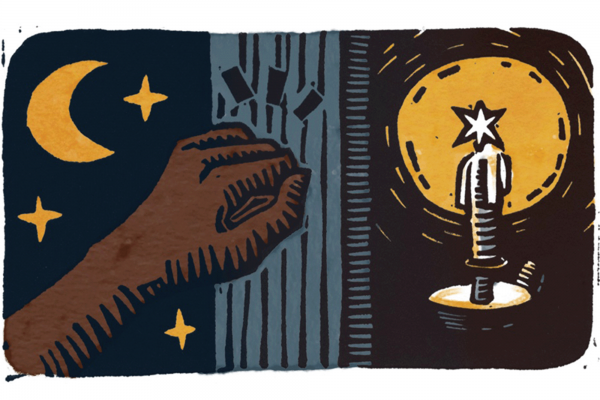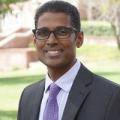RARELY DO YOU see powerful people advocate for the benefit of others outside their “own” political or economic group. There is a tendency on the part of the elite to leverage their privilege for their own benefit while disguising it as public good, as the concept of “elite capture” has exposed. And the state is often complicit in reinforcing policies and practices that concentrate resources into the hands of those who already have enough. In a 1962 sermon titled “A Knock at Midnight” (see Luke 11:5-6), Martin Luther King Jr. diagnosed the state of the nation and church saying, “It is midnight in the social order.” He urged the church to respond to the oppressed who “knock on the door,” even when it’s inconvenient. “How often has the church left [people] disappointed at midnight, while it slept quietly in a chamber of pious irrelevancy,” preached King.
Despite decreasing numbers, the U.S. church wields enormous political and economic power. This month’s readings showcase people — the powerful and the not so powerful — who exercise their agency for the good of those who seemingly have little to offer in return. The texts highlight the church’s moral and theological imperative to employ its power to open the door to the ones who desperately knock. Will the church that gathers in the name of Jesus ignore the state’s complicity in oppressive structures or will it act as the “conscience of the state,” as Dr. King urged? Does the church privilege its own comfort or does it attend to the vulnerable, even at the risk of its own interests? King concluded, “the greatest challenge facing the church today is to keep the bread fresh and remain a Friend to [humanity] at midnight.”
March 3
God Leverages Privilege
Exodus 20:1-17; Psalm 19; 1 Corinthians 1:18-25; John 2:13-22
MANY OF US watch intently as debates continue to play out over the issue of displaying the Ten Commandments in U.S. courtrooms, public schools, and other government buildings. The Ten Commandments, given in the context of divine covenant with a specific people, begin by emphasizing human loyalty to God, the dominant partner in the treaty (Exodus 20:1-2). They place greater emphasis on human well-being and articulate a strong commitment to vulnerable individuals (verses 8-17). Most of the commandments are based on negative formulations; for example, people should refrain from violent behaviors against the vulnerable. As Old Testament scholar Terence E. Fretheim notes, their main goal is “to protect [the human community] from behaviors that have the potential of destroying it.” The commandments teach people to honor our human rights in gratitude for God having delivered us from bondage (verse 1). Loyalty to God is expressed in how we treat the vulnerable. God leverages divine privilege to protect the defenseless.
Georgia, Indiana, Louisiana, Mississippi, Oklahoma, Tennessee, and South Dakota are among the states with laws allowing the displays of the Ten Commandments on public property. Strangely, these are also places that most victimize the people the Decalogue seeks to protect. Four of those states are in the top 10 for implementing the death penalty. Prominent displays on public buildings not only weaken First Amendment freedoms, but too often they provide a veneer of religiosity over courts that practice retribution not mercy, deny justice to the defenseless, and rob dignity from those for whom the Ten Commandments advocate.
March 10
Living Differently
Numbers 21:4-9; Psalm 107:1-3, 17-22; Ephesians 2:1-10; John 3:14-21
FOOTBALL QUARTERBACK Tim Tebow made headlines in 2009 when he wrote John 3:16 in his eye black during a championship game. That verse, as well as the preceding one, explicitly promises eternal life to believers. Many Christians interpret Jesus’ mention of eternal life as an assurance that believers will have instant access to grace and be showered with material riches. In a cultural and religious context where consumerism has made major inroads into Christianity, the idea of a God who, in return for simply “believing,” grants eternal life, provides unlimited wealth, and remedies all problems is the definition of a “prosperity gospel.”
But “eternal life” in John’s gospel is not about material wealth or even about living forever. The Greek word aionios in John 3:15-16, often translated as “eternal” or “everlasting,” has a range of meanings. It contains the source of the word “eon” and, in John’s gospel, refers to a quality of time and to an era that is unlike the current age. When coupled with the word zoe (“life”), John invokes an era not defined by the ethos of the current era. Coming on the heels of Jesus’ suggestion that his exaltation lies in being lifted up on the cross of state execution for the salvation of others, this “eternal life” invites followers to embrace a new way of being in the world. We empty ourselves for others and live on by choosing to live differently, following the practices of the One over whom death holds no power.
March 17
A Seed’s Sacrifice
Jeremiah 31:31-34; Psalm 119:9-16; Hebrews 5:5-10; John 12:20-33
IN JOHN 12, Jesus says that the hour of his death on the cross is his glorification (verse 23). He does not glorify death but suggests that his act of putting himself on the line for others is his finest hour. The grain of wheat (verse 24) shares a similar path. Jesus mentions no sower, only the kernel. The verb pipto (“falls”) in active voice implies that the grain exercises its agency in falling to the ground. Does the grain privilege its self-interest and preserve itself, as might be the natural inclination, or does it fall to the ground and die? The grain of wheat chooses the latter, which requires courage and imagination. Sacrificing itself for others goes against the instinct of self-preservation. Paradoxically, by falling to the ground and dying, it extends its presence.
The Seed Underground: A Growing Revolution, Janisse Ray’s prophetic book about food security, describes the ways many people across the U.S. are preserving seeds for generations to come. They are planting those seeds in order to harvest more and rebuild seed reserves. At a time when multinational companies monopolize the grain business, the idea of a seed choosing its destiny raises questions about who makes decisions about food production and toward what end? When seeds and oppressed people exercise their agency, they benefit families, the community, and the earth. All are interconnected and share a common destiny.
March 24
Paradox of Power
Isaiah 50:4-9; Psalm 31:9-16; Philippians 2:5-11; Mark 11:1-11
ACCORDING TO A recent social media craze, men think about the Roman Empire all the time. Maybe late-stage empires share some similarities. Only 20 years before Paul wrote his letter during house arrest in Rome to the nascent church in Philippi, the region was the site of the famous Battle of Philippi between the officers of the old imperial Republic and the faction that assassinated Julius Caesar. They were brutally violent in their quest for power. Paul’s letter models a radically different type of power — one that sets aside divine privilege to become one with the powerless (Philippians 2:6-8). The Greek word kenosis (“emptied”) in verse 7 describes Christ setting aside divine status to be in solidarity with the oppressed. He refused to mimic the empire’s violence. From Paul’s perspective, that story is at the core of Christian identity.
There is something paradoxical in Paul’s narration. It was precisely in giving up status that Christ gained more power. Mark’s description of Jesus’ entry into Jerusalem similarly highlights how Jesus gained power not by aligning with the empire but by becoming one with those who were victimized by it. Power is not the problem. How one gets it and to what end one uses it can be very problematic. That’s something for the U.S. church to ponder.
March 31
Mary’s Turnaround
Isaiah 25:6-9: Psalm 118:1-2, 14-24; Acts 10:34-43; John 20:1-18
EVERYONE LOVES A great turnaround story. Comebacks, such as track and field star Sha’Carri Richardson overcoming a series of major setbacks to win the world title in the 100-meter race last summer, speak to human resilience. Mary Magdalene has a remarkable comeback in John’s post-resurrection stories. Traumatized by the violence of the empire, she went to the tomb and was shaken by the seeming disappearance of Jesus’ body. Unlike Peter and John who conveniently went home believing that Jesus had not risen from the dead, Mary chose the inconvenient path of remaining in risky spaces.
When Mary was first asked why she was weeping, she turned and saw Jesus but did not recognize him. After an exchange with Jesus, she turned a second time. This time she did recognize him. The Greek verb strepho means to “change direction, transition, turn around.” Mary turned around twice before she recognized Jesus. She had to do a double take — literally and figuratively — to fully comprehend the significance of their encounter. For someone who had endured major setbacks and almost given up hope, it was nearly impossible to believe that Jesus rose again. Mary was aware of the forces of death but had a deep-seated assurance about life. Mary’s ability to see the risen Jesus was initially impaired by the trauma of imperial violence. Yet she turned her pain into resilience, fear into defiance, and despair into hope. It was a remarkable turnaround moment, one which allowed her to see the seemingly impossible — that Jesus defeated the forces of death. Alleluia!

Got something to say about what you're reading? We value your feedback!






